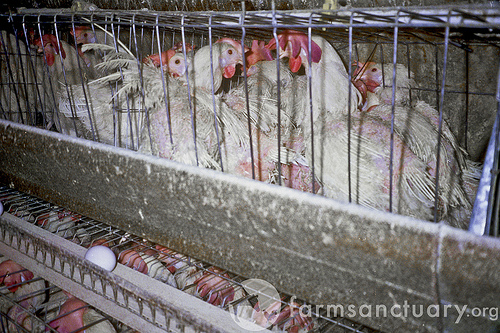Battery cages, an industry standard, prevent hens from fully extending their wings.Photo: Farm Sanctuary
Cross-posted from Food Safety News.
Last week, the Humane Society of the United States (HSUS) held an unusual press conference. The group announced an agreement with its long-time adversary, the United Egg Producers (UEP), to jointly seek federal legislation that would improve the housing conditions of egg-laying hens.
As a result, HSUS is calling off its recent efforts to get ballot measures passed in Oregon and Washington State on the issue.
Those initiatives would have prohibited cages so confining that egg-laying hens could not fully extend their wings, as well as barred the sale of eggs from producers that didn’t comply. California and Michigan already have similar laws.
Given how strongly the egg industry has resisted efforts to ban battery hen cages over the years, it’s understandable that many animal welfare groups would praise the agreement. (Many details of the deal are still sketchy; I am told the legal agreement between HSUS and UEP is confidential so I have not seen it.)
Change is still a long way off
But the celebration seems premature. First of all, we are far from seeing any actual law enacted. HSUS and UEP have only agreed to ask Congress to pass a bill. The legislative process is very messy, and there will no doubt be detractors and dirty deals cut down the road, if we even get that far. Has anyone noticed that the current Congress isn’t exactly in the mood for more regulation?
Also, other powerful trade groups could derail the process. Already, the National Pork Producers Council is complaining about the prospect of federal law, and is likely lining up other animal trade groups to oppose the HSUS-UEP measure out of fear that they will be next.
Second, the agreement allows industry a long phase-in period for the increase in housing space requirements. (Other provisions would take place upon enactment.) While space is to double current standards in “enriched cages,” egg facilities have 15-18 years to come into full compliance. In the meantime, there will be incremental requirements for increasing space available for birds in cages. (However, California producers would come into full compliance by 2015, as required by the ballot measure passed there in 2008.)
Given the long phase-in, how will the industry be held accountable for the changes? According to HSUS, the new standards will become part of the UEP’s current certification program, which already has inspection requirements, usually conducted by USDA. But considering the UEP’s history of misleading consumers (as HSUS has complained about), combined with Congress’s current propensity for cutting both the FDA and the USDA’s budget, it’s unclear if this plan will be sufficient.
Industry’s biggest win: uniformity
Over the last several years, HSUS and other groups have been gaining traction in various states by going directly to the voters through the state ballot process. (In some states, industry agreed to legislation due to the threat of a ballot passing). If there’s one thing that industry hates even more than losing, it’s lack of uniformity. Given these state victories, the egg industry was facing the expensive headache of ongoing battles, along with having to conform to a variety of standards. Here’s how UEP explains its position [PDF]:
We believe such legislation is necessary in order to protect our customers and the marketplace from any disruption that could occur if a patchwork series of state laws and regulations regarding hen housing were implemented.
Translation: lack of predictability coupled with economic risk brought Big Egg to the table. In addition to specific concessions on animal treatment and a long phase-in, industry’s biggest coup in this deal is preemption. This means that any federal law will trump state law. So, whatever the resulting federal law requires will be the best standards we can ever get anywhere, because states cannot go further.
While it is important to have minimal federal standards, states should remain free to pass stronger laws if they so choose. In other words, federal government standards should create a floor, and not a ceiling. This has been the accepted approach in decades past, especially with environmental and public health laws. But in recent years, corporations have become so powerful that they are increasingly able to strong-arm advocacy groups and lawmakers into giving up this critical state right. The potential long-term ramifications are cause for concern.
We learn about what works by experimenting at the state level. That’s why states are called laboratories of democracy. Are enriched cages the best method, or might cage-free be better? What about the food safety implications: Do enriched cages reduce risk of bacterial infection such as salmonella? (Remember last year’s recall of half a billion eggs?) What about the potential economic impact on small and medium size farmers? These sorts of questions are often better answered at the local level before making national policy decisions. But now, that opportunity has been taken away, maybe forever.
Paul Shapiro, senior director of Farm Animal Protection at HSUS, strongly defended the preemption compromise by explaining to me the impossible politics in state capitals. That’s why HSUS took the issue directly to the people with ballot measures. But only a small number of states allow ballot initiatives.
When I asked about passing laws through state legislatures, he scoffed, saying it’s a dead end, particularly in large egg-producing states — like Iowa, the state that almost passed a law to ban taking photos of animal cruelty. What are the odds we’d see that same legislature pass a bill to ban the actual cruelty?
Shapiro says the only state laws that have passed to protect farm animals came as a result of a ballot measure or the threat of one. But ballot initiative campaigns are also insanely expensive. Shapiro estimates that HSUS would have spent $10 million to maybe pass the two initiatives in Oregon and Washington.
“It’s not a coincidence that every state that has passed a farm animal welfare measure allows ballot measures,” he told me. “There just isn’t a pathway in the major egg production states to help these birds, yet with this federal bill, we have the hope of helping the 200 million laying hens who live in these states.”
Is this how democracy works?
I can’t help wondering how much more progress might have been made at the local and state level had the reform movement been able to grow further. Preemption stops that movement in its tracks, which is why industry insists on it. That they can get it speaks to industry’s power
and a political system that is so heavily tilted in favor of economic interests that groups like HSUS are put in a position where they have to make such huge concessions to see change happen.
How did industry get so powerful that groups pushing for reform are now negotiating in secret and giving up important public policy tools like local lawmaking? Sure, the political process also involves backroom deal-making, but at least it’s still somewhat public. Our democracy is in trouble when just a few private parties are making major decisions that affect egg producers small and large and more than 260 million hens, not to mention a nation of egg eaters.
Let’s hope that when the bill provisions proposed by HSUS and UEP get to Congress, more public involvement and transparency will come out of the legislative process. Then maybe it will be time to celebrate.



